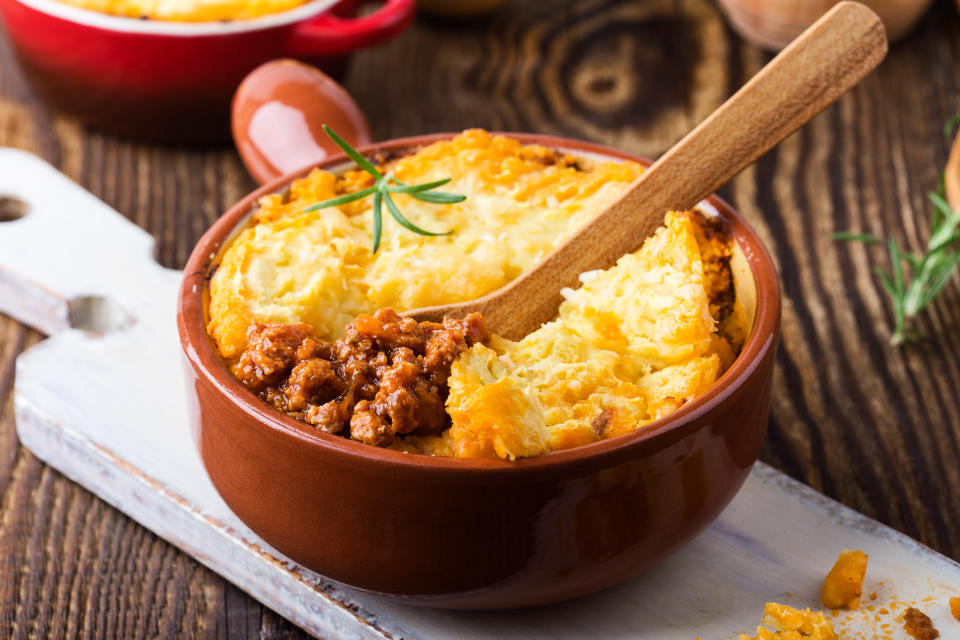How to comfort eat like a nutritionist

The arrival of winter conjures up memories of mulled wine, hearty pies and sticky puddings.
While many look forward to these seasonal indulgences, staying healthy remains as important as ever – particularly given coronavirus complications are more common among the obese.
Nutrition experts have therefore shared how they keep their health in check, while enjoying a little indulgence.
Read more: What does a healthy food day look like?

Eating a healthy, balanced diet means an occasional treat can be enjoyed guilt-free.
“I don’t like to label foods as being good or bad and as such I think there is room for everything as part of a balanced diet,” Rob Hobson, a registered nutritionist for Healthspan, told Yahoo UK.
“Balance is important and if your comfort foods are viewed as a treat, not an everyday occurrence, alongside a healthy diet, then this is fine.
Read more: The foods that boost – and zap – libido
“I do comfort eat occasionally. As my diet is pretty good most of the time, I enjoy these moments of indulgence rather than feel guilty about them.
“I don’t have a sweet tooth but could easily demolish a large packet of crisps.
“I moderate my intake by putting a serving into a dish rather than eating straight from the bag and I would normally have crisps with a dip like hummus.”
Snacks
When it comes to snacks, almonds can be surprisingly versatile.
“They provide protein, fibre and good fats, and are packed with many vitamins and minerals including calcium, magnesium, phosphorus, zinc, copper and vitamin E,” registered dietitian Juliette Kellow told Yahoo UK.
“I tend to have more of a savoury tooth than a sweet one so I particularly love a handful of paprika-spiced almonds.
“When I’m in the mood for something sweet, I often make my own truffles from a combo of dates and ground almonds, dipped in chocolate.”
Watch: Healthy swaps for autumnal comfort foods
Full English breakfast
Many consider a full English breakfast a treat. While processed meats like bacon and sausages have been linked to bowel cancer, simple tweaks can make them healthier.
“If you are going to eat them I would say do so very occasionally and of course always opt for the best quality,” said Hobson.
“I would suggest trying plant-based options but understand they are probably incomparable for those who like to eat meat.”
Read more: 5 foods you didn’t know are 1 of your 5-a-day
Other components of a full English can also be surprisingly good for you.
“You could try poaching your eggs and including a few servings of vegetables such as grilled tomatoes, sautéed spinach or mushrooms,” said Hobson.
“Switching to wholegrain bread is a good way to increase your intake of fibre.”
Kellow also recommends grilling sausages rather than frying them.
Go-to dinners
Simple tweaks can also give go-to winter dinners, like sausages and mash, a healthy twist.
“Try sweet potato mash or leaving the skin on the potatoes when you mash them,” said Hobson.
When making a shepherd’s pie or lasagne, beef or lamb mince can be swapped for turkey or plant-based alternatives.
“Use a little less of it and add extra veg,” said Kellow. “Lentils are also a great choice for adding in to boost fibre.
“Two other great standbys for speedy comfort food – a jacket potato with baked beans or a bowl of vegetable and bean soup.”
Cheese platters
A cheese platter is a favourite indulgence for many. While cheese is high in salt and saturated fat, it also contains a multitude of nutrients.
“Cheese has lots of nutritional benefits, which include being a source of protein and essential nutrients such as calcium, zinc and vitamin B12,” said Hobson.
“The vitamin B12 content of this food makes it beneficial for vegetarians who do not eat meat or fish.”
Reduced-fat cheeses are available, while feta, goat’s cheese and halloumi are naturally lower in calories than the go-to cheddar.
For those who enjoy a bit of grated cheese with their spaghetti bolognese, Kellow recommends using a fine-toothed grater to make the serving go further.
Desserts
While those with a sweet tooth may struggle to stay healthy, they can try halving the sugar content of a dessert recipe.
“You could also try using spices like cinnamon, nutmeg or vanilla pod to sweeten foods and drinks,” said Hobson.
New ways of serving fruit can also make it feel like more of a treat.
“I’m a big fan of frozen grapes, they’re almost like sweets,” said Kellow.
“Remember to chop them up if you’re going to give them to young children as whole grapes can be a choking hazard.
“Also, puree frozen berries or mango chunks then stir into plain yogurt, and freeze in lolly moulds.”
Watch: Healthy swaps for the desserts you crave


